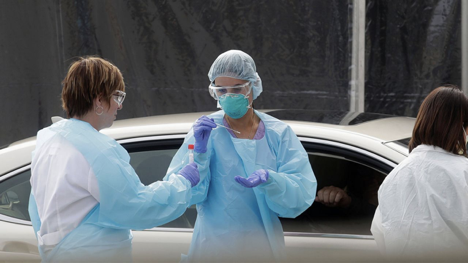Guidance for COVID-19 Essential Workers

25 Mar 2020
The COVID-19 pandemic has swept across the world, bringing unprecedented changes with it. Employees and employers are working together to determine how to best protect everyone’s health while attempting to keep businesses moving forward. Therefore, many employees must go to work providing essential services, while many transition to working from home.
Health care and public health workers come to mind immediately, but there are many more roles classified as essential workers. Persons in law enforcement, first response, food and agriculture, manufacturing, utilities, mass transit, garbage collection, banking, public works and communication providers all must tend to their responsibilities to provide what the population needs.
So the question is, for those who must go to their places of employment, what can they do to protect themselves and their families?
At Work
All employers and their employees should be proactive in enhancing workplace safety. Working together to adhere to CDC guidelines is one step to promote worker safety. Finding unique methods to rotate shifts or worker requirements within shifts to match those guidelines should be implemented immediately. Being knowledgeable about and working to protect the areas where employees come into contact with others is critical. OSHA and the U.S. Department of Health and Human Services have developed guidelines for preparing workplaces here.
Getting to and from work presents significant challenges now as well. In general, treating a car like the home is advisable. Clean commonly used areas with sanitizing wipes or soap and water both before and after going to work. If public transportation is necessary, limit points of contact. This can be done by avoiding touching anything and wearing disposable gloves. Then, be sure to keep hands and fingers away from the face and wash or sanitize hands as soon as possible. The CDC continues to state the best practices individuals can take is to wash hands. Read more about individual protection here.
If a situation arises where an employee must leave work for reasons related to COVID-19, the U.S. Department of Labor Wage and Hour Division is an appropriate resource on the path to providing sick leave. Requirements for employers and workers to follow when responding to those reasons related to COVID-19, such as individual sick leave or a necessity to care for family members, can be found here.
The U.S. Department of Labor also provides protection for employees in terms of unemployment insurance. States have been given more flexibility to administer unemployment to those impacted by COVID-19. Federal law allows states to pay benefits to employees who can’t go to work because their employer temporarily ceases operations. Also, benefits allow for individuals who are quarantined with the expectation of returning to work or an individual has to leave their job to care for a family member.
Child Care
Finding child care may be the most difficult challenge for essential workers. Child care providers are balancing the ability to offer their services with limiting the spread of the virus. For many individuals, relying on extended family members, neighborhood collusion or church setups can resolve the issue. For those without that option, Child Care Aware is a national organization designed to provide assistance.
The Belvidere Family YMCA is working diligently to open its doors, with an emergency license, to children of essential workers. If you are looking for childcare, this may be a possible option coming soon. Contact the YMCA for more information.
Care for Yourself
Much focus is placed on what can be done at a place of employment or for children, but an often forgotten area of importance is what a person can do to keep themselves healthy. To protect the ability to work, a person should take steps to maintain a strong immunity. Perhaps most important is to find productive ways to manage stress. Numerous research studies have provided links between how high levels of stress lead to individuals developing illnesses. One reason may be stress can lead to neglect of other healthy habits, such as keeping proper diets, exercise and sleep patterns. Eating too much processed or fried food will weaken the immune system and lead to inflammation. Exercising every day ensures proper antibody production and circulation, and lowering stress hormones. Doing so is always relative to a normal exercise level. For a person who doesn’t exercise much normally, attempting a five-mile run may be worse for the immune system than a brisk 30- minute walk. Finally, getting a good night’s rest is critical to allowing the body to maintain a healthy immune system. According to the Mayo Clinic, persons who do not get enough quality sleep are more likely to get sick after being exposed to a virus and take longer to recover. A typical adult should get between seven and eight hours of sleep nightly.
We Thank Healthcare Providers & Other Essential Workers
Essential workers are the lifeline needed to help the entire country get through this time of crisis. Keeping them healthy and productive is of utmost importance. There are ways every individual can help with that effort. The websites Donate PPE and PPE Link provide instructions on where and what personal protective equipment can be donated. Also, the Association of American Universities is keeping an updated Twitter list of universities seeking donations at AAU@AAUniversities.
More Topics














